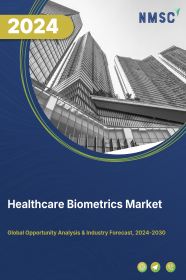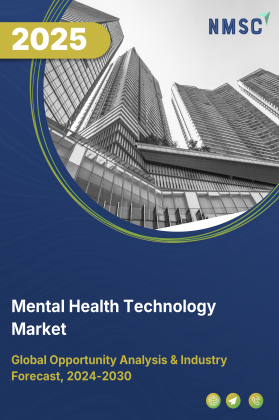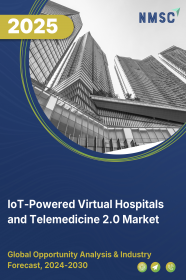
Healthcare Biometrics Market by Technology (Single-factor Authentication, Multifactor Authentication, and Multimodal Authentication), by Application (Medical Record and Data Center Security, Patient Identification and Tracking, Care Provider Authentication, Home/Remote Patient Monitoring and Others), by End User (Hospitals, Clinics, Clinical Laboratories and Healthcare Institutions)– Global Opportunity Analysis and Industry Forecast 2024–2030
Market Definition
The global Healthcare Biometrics Market size was valued at USD 10.59 billion in 2023 and is predicted to reach USD 41.15 billion by 2030 with a CAGR of 21.42% from 2024–2030. Healthcare biometrics is a specialized area of the healthcare sector that uses biometric technology to identify, authenticate, and track people's physiological and behavioral traits.
Healthcare biometrics involves the use of biometric technology, which utilizes distinct physiological or behavioral characteristics such as fingerprints, iris scans, facial recognition, or voice patterns, to improve patient identification and healthcare delivery.
This technology offers a wide range of advantages, such as improved patient data security, decreased medical identity fraud, and more patient privacy thanks to cutting-edge authentication techniques. To reliably identify patients and enable quick access to their medical histories, the healthcare biometric expands its reach across a wide range of industries, including healthcare, pharmaceuticals, health insurance, biotechnology, hospitality, and government sectors.
Market Dynamics and Trends
The increasing growth of the healthcare biometric market is driven by the implementation of biometric solutions in health cards, which can streamline patient identification processes, reduce fraud, and ensure accurate access to medical records.
For instance, in August 2022, the French Parliament approved a project worth USD 21.3 million to introduce biometric health cards. These cards feature unique biometric identifiers and are linked to individuals' bank accounts. This initiative enhanced patient identification for healthcare providers, combat fraud, and ultimately improved healthcare services, potentially driving the growth of the healthcare biometric market.
Additionally, the growing preference for contactless and hygienic identification methods, such as facial recognition and contactless fingerprinting, received a significant boost in the healthcare biometrics market, post-pandemic. This led to a shift towards Zero User Interface (UI) which enhanced safety measures, reduced physical contact, and improved overall patient experience, driving the growth of the healthcare biometric market.
For instance, the National Library of Medicine report from November 2021 highlighted that the COVID-19 pandemic expedited the adoption of biometric technology which is driven by hygiene concerns. This, in turn, fast-tracked the transition towards Zero UI, an interface integrating speech, gestures, hand interaction, eye tracking, contactless fingerprinting, and facial recognition for enhanced user control.
However, the adoption of biometrics in healthcare is restrained by complex enrolment procedures and operational challenges, which can be time-consuming and inefficient during initial adoption in healthcare settings.
On the contrary, technological advancement such as the introduction of Multimodal Biometric Pod which integrates multiple highly accurate and secure biometric recognition methods is expected to create ample opportunities in the growth of the healthcare biometrics market in the coming years.
For instance, in December 2022, Thales introduced an advanced multimodal biometric solution aimed at enhancing border and travel security. This innovative technology combines multiple biometric authentication methods to provide both heightened security measures and increased convenience for travelers.
Market Segmentations and Scope of the Study
The healthcare biometrics market is segmented based on technology, application, end users, and region. Based on technology, the market is divided into single-factor authentication, multifactor authentication, and multimodal authentication.
Based on single-factor authentication, the market is further divided into fingerprint recognition, face recognition, vein recognition, iris recognition, palm geometric recognition, and behavioral recognition. Based on behavioral recognition, the market is further divided into signature recognition, voice recognition, and other behavioral recognition.
Based on multifactor authentication, the market is further divided into smart cards with biometrics and biometrics with PIN. Based on multimodal authentication, the market is further divided into two-factor biometrics and three-factor biometrics. Based on application, the market is classified into medical record and data center security, patient identification and tracking, care provider authentication, home/remote patient monitoring, and others.
Based on end users, the market is categorized into hospitals, clinics, clinical laboratories, and healthcare institutions. Regional breakdown and analysis of each of the aforesaid segments comprises North America, Europe, Asia-Pacific, and Rest of the World (RoW).
Geographical Analysis
North America holds the dominant share of the healthcare biometric market at present and is expected to continue its dominance during the forecast period, due to the increased adoption of biometric technology by the healthcare industry.
For instance, in July 2023, BIO-key International Inc. announced a strategic partnership with Paulding County Hospital (PCH) to implement the PortalGuard Identity-as-a-Service (IDaaS) cloud platform. This collaboration is geared towards improving the efficiency of healthcare services and increasing security awareness, emphasizing the importance of robust biometric authentication.
Furthermore, the key players in this region such as LifeQ, Inc., 3M Cogent, Inc., and Suprema, Inc. are adopting various market strategies of product launch which is driving the market for healthcare biometrics in North America.
For instance, in April 2023, LifeQ launched the initial phase of its virtual care platform during the Health Information Management Systems Society's annual conference. The launch was aimed toward introducing an all-encompassing platform for ongoing health monitoring, contributing to disease screening and root cause identification.
On the other hand, Asia-Pacific is expected to show a steady rise in the healthcare biometric market. Various companies such as Mitsubishi Electric Corporation and ZKTeco are actively contributing to the market growth of healthcare biometrics through innovative technologies such as fingerprint recognition, iris scans, and face and voice print scans. These technologies aim to enhance patient care, data security, and operational efficiency.
For instance, in January 2022, Mitsubishi Electric Corporation introduced HealthCam in Japan, a facial recognition health monitoring technology that uses biometrics to track a person's heartbeat, blood oxygen level, body temperature, and other health indicators.
Moreover, the implementation of strategic expansion moves by various companies such as ZKTeco, and NCE corporations, towards the development of healthcare biometrics is driving the growth of the market in this region.
For instance, in November 2021, ZKTeco, a global leader in biometrics and security solutions, launched a new plant in Bangalore, India. The establishment of this plant served as a pivotal step to meet this growing demand and further strengthen the company's foothold in the healthcare biometrics market of Asia-Pacific.
Competitive Landscape
The healthcare biometrics industry comprises various market players such as Thales Group, Imprivata, Inc., BioIntelliSense, LifeQ, Inc., 3M Cogent, Inc., Suprema, Inc., Bio-Key International, Inc., Fujitsu Limited, MorphoTrust, Mitsubishi Electric Corporation, and others. These market players are adopting acquisitions and product launches as their key developmental strategies across multiple regions to maintain their dominance in the healthcare biometrics market.
For instance, in October 2022, BioIntelliSense acquired AlertWatch, an FDA-cleared patient monitoring solution, enabling enhanced integration and an intuitive display of patient data for more efficient and actionable clinical decisions. This significantly strengthened the healthcare biometrics market by offering advanced and comprehensive patient observation solutions.
Also, in May 2021, Imprivata, Inc., partnered with Aware, Inc., and IDEMIA to launch healthcare mobile facial recognition solution. The new mobile face biometrics solution is intended to enable simplified self-enrollment for electronic prescriptions for controlled substances (EPCS) in compliance with U.S. Drug Enforcement Agency (DEA) regulations.
Key Benefits
-
The report provides quantitative analysis and estimations of the healthcare biometrics market from 2024 to 2030, which assists in identifying the prevailing market opportunities.
-
The study comprises a deep-dive analysis of the current and future healthcare biometrics market trends to depict prevalent investment pockets in the market.
-
Information related to key drivers, restraints, and opportunities and their impact on the healthcare biometrics market is provided in the report.
-
A competitive analysis of the players, along with their market share is provided in the report.
-
SWOT analysis and Porter's Five Forces model are elaborated in the study.
-
Value chain analysis in the market study provides a clear picture of the roles of stakeholders.
Healthcare Biometric Market Key Segments
By Technology
-
Single-factor Authentication
-
Fingerprint Recognition
-
Face Recognition
-
Vein Recognition
-
Iris Recognition
-
Palm Geometric Recognition
-
Behavioral Recognition
-
Signature Recognition
-
Voice Recognition
-
Other Behavioral Recognition
-
-
-
Multifactor Authentication
-
Smart Card with Biometrics
-
Biometric with PIN
-
-
Multimodal Authentication
-
Two-Factor Biometrics
-
Three-Factor Biometrics
-
By Application
-
Medical Record and Data Center Security
-
Patient Identification and Tracking
-
Care Provider Authentication
-
Home/Remote Patient Monitoring
-
Others
By End User
-
Hospitals
-
Clinics
-
Clinical Laboratories
-
Healthcare Institutions
By Region
-
North America
-
The U.S
-
Canada
-
Mexico
-
-
Europe
-
The UK
-
Germany
-
France
-
Italy
-
Spain
-
Denmark
-
Netherlands
-
Finland
-
Sweden
-
Norway
-
Russia
-
Rest of Europe
-
-
Asia-Pacific
-
China
-
Japan
-
India
-
South Korea
-
Australia
-
Indonesia
-
Singapore
-
Taiwan
-
Thailand
-
Rest of Asia-Pacific
-
-
Rest of the World (RoW)
-
Latin America
-
Middle East
-
Africa
-
REPORT SCOPE AND SEGMENTATION:
|
Parameters |
Details |
|
Market Size in 2023 |
USD 10.59 Billion |
|
Revenue Forecast in 2030 |
USD 41.15 Billion |
|
Revenue Growth Rate |
CAGR of 21.42% from 2024 to 2030 |
|
Analysis Period |
2023–2030 |
|
Base Year Considered |
2023 |
|
Forecast Period |
2024–2030 |
|
Market Size Estimation |
Billion (USD) |
|
Growth Factors |
|
|
Countries Covered |
28 |
|
Companies Profiled |
10 |
|
Market Share |
Available for 10 companies |
|
Customization Scope |
Free customization (equivalent up to 80 working hours of analysts) after purchase. Addition or alteration to country, regional, and segment scope. |
|
Pricing and Purchase Options |
Avail customized purchase options to meet your exact research needs. |
KEY PLAYERS
-
Thales Group
-
Imprivata Inc.
-
BioIntelliSense
-
LifeQ Inc.
-
3M Cogent Inc.
-
Suprema Inc.
-
Bio-Key International Inc.
-
Fujitsu Limited
-
MorphoTrust
-
Mitsubishi Electric Corporation




















 Speak to Our Analyst
Speak to Our Analyst

























